八年级下册英语语法总复习
- 格式:doc
- 大小:103.00 KB
- 文档页数:12
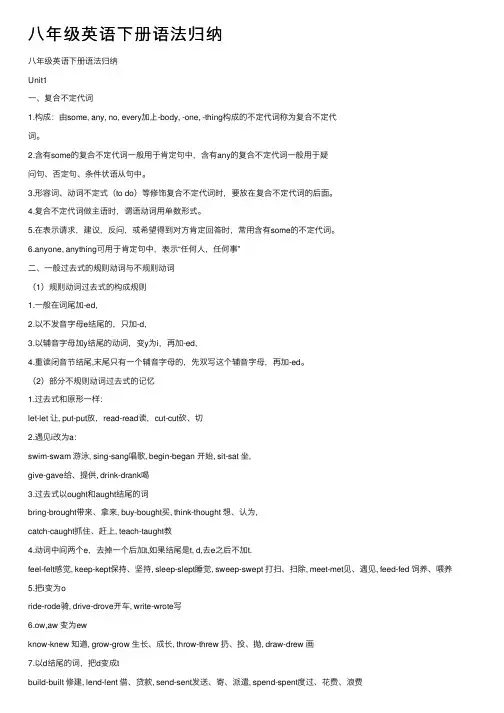
⼋年级英语下册语法归纳⼋年级英语下册语法归纳Unit1⼀、复合不定代词1.构成:由some, any, no, every加上-body, -one, -thing构成的不定代词称为复合不定代词。
2.含有some的复合不定代词⼀般⽤于肯定句中,含有any的复合不定代词⼀般⽤于疑问句、否定句、条件状语从句中。
3.形容词、动词不定式(to do)等修饰复合不定代词时,要放在复合不定代词的后⾯。
4.复合不定代词做主语时,谓语动词⽤单数形式。
5.在表⽰请求,建议,反问,或希望得到对⽅肯定回答时,常⽤含有some的不定代词。
6.anyone, anything可⽤于肯定句中,表⽰“任何⼈,任何事”⼆、⼀般过去式的规则动词与不规则动词(1)规则动词过去式的构成规则1.⼀般在词尾加-ed,2.以不发⾳字母e结尾的,只加-d,3.以辅⾳字母加y结尾的动词,变y为i,再加-ed,4.重读闭⾳节结尾,末尾只有⼀个辅⾳字母的,先双写这个辅⾳字母,再加-ed。
(2)部分不规则动词过去式的记忆1.过去式和原形⼀样:let-let 让, put-put放,read-read读,cut-cut砍、切2.遇见i改为a:swim-swam 游泳, sing-sang唱歌, begin-began 开始, sit-sat 坐,give-gave给、提供, drink-drank喝3.过去式以ought和aught结尾的词bring-brought带来、拿来, buy-bought买, think-thought 想、认为,catch-caught抓住、赶上, teach-taught教4.动词中间两个e,去掉⼀个后加t,如果结尾是t, d,去e之后不加t.feel-felt感觉, keep-kept保持、坚持, sleep-slept睡觉, sweep-swept 打扫、扫除, meet-met见、遇见, feed-fed 饲养、喂养5.把i变为oride-rode骑, drive-drove开车, write-wrote写6.ow,aw 变为ewknow-knew 知道, grow-grow ⽣长、成长, throw-threw 扔、投、抛, draw-drew 画7.以d结尾的词,把d变成tbuild-built 修建, lend-lent 借、贷款, send-sent发送、寄、派遣, spend-spent度过、花费、浪费Unit2频度副词1.表⽰次数、频率的副词称为频度副词。
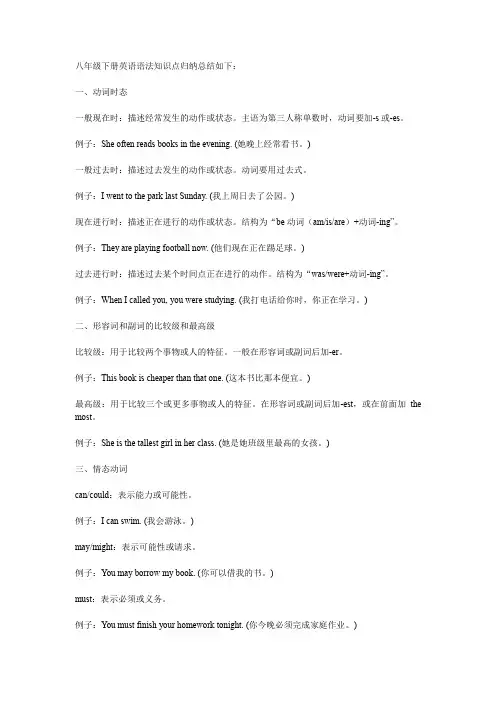
八年级下册英语语法知识点归纳总结如下:一、动词时态一般现在时:描述经常发生的动作或状态。
主语为第三人称单数时,动词要加-s或-es。
例子:She often reads books in the evening. (她晚上经常看书。
)一般过去时:描述过去发生的动作或状态。
动词要用过去式。
例子:I went to the park last Sunday. (我上周日去了公园。
)现在进行时:描述正在进行的动作或状态。
结构为“be动词(am/is/are)+动词-ing”。
例子:They are playing football now. (他们现在正在踢足球。
)过去进行时:描述过去某个时间点正在进行的动作。
结构为“was/were+动词-ing”。
例子:When I called you, you were studying. (我打电话给你时,你正在学习。
)二、形容词和副词的比较级和最高级比较级:用于比较两个事物或人的特征。
一般在形容词或副词后加-er。
例子:This book is cheaper than that one. (这本书比那本便宜。
)最高级:用于比较三个或更多事物或人的特征。
在形容词或副词后加-est,或在前面加the most。
例子:She is the tallest girl in her class. (她是她班级里最高的女孩。
)三、情态动词can/could:表示能力或可能性。
例子:I can swim. (我会游泳。
)may/might:表示可能性或请求。
例子:You may borrow my book. (你可以借我的书。
)must:表示必须或义务。
例子:You must finish your homework tonight. (你今晚必须完成家庭作业。
)四、被动语态被动语态用于描述事物的状态或描述被动发生的动作。
结构为“be动词(am/is/are/was/were)+动词的过去分词”。
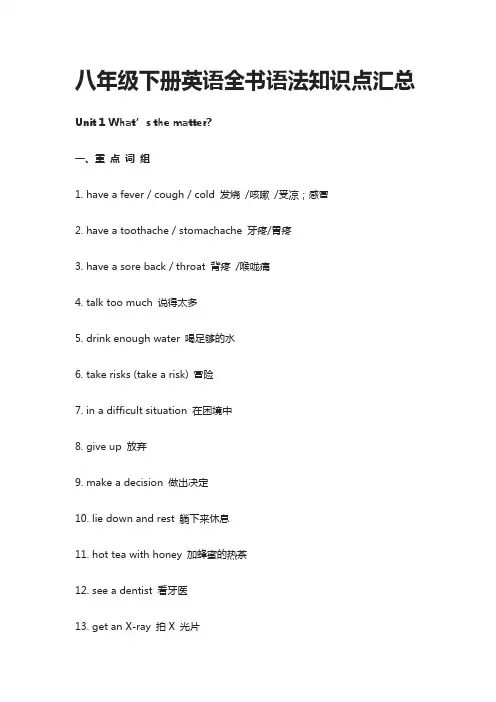
八年级下册英语全书语法知识点汇总Unit 1 What’s the matter?一、重点词组1. have a fever / cough / cold 发烧/咳嗽/受凉;感冒2. have a toothache / stomachache 牙疼/胃疼3. have a sore back / throat 背疼/喉咙痛4. talk too much 说得太多5. drink enough water 喝足够的水6. take risks (take a risk) 冒险7. in a difficult situation 在困境中8. give up 放弃9. make a decision 做出决定10. lie down and rest 躺下来休息11. hot tea with honey 加蜂蜜的热茶12. see a dentist 看牙医13. get an X-ray 拍X 光片14. take one’s temperature 量体温15. put some medicine on sth. 在……上面敷药16. feel very hot 感到很热17. sound like 听起来像18. all weekend 整个周末19. in the same way 以同样的方式20. go to a doctor 看医生21. go along 沿着……走22. on the side of the road 在马路边23. shout for help 大声呼救24. without thinking twice 没有多想25. get off 下车26. have a heart problem 有心脏病27. to one’s surprise 使……惊讶的;出乎……意料28. thanks to 多亏了;由于29. in time 及时30. save a life 挽救生命31. get into trouble 造成麻烦(或烦恼)32. right away 立刻;马上33. because of 由于34. get out of 离开;从……出来35. hurt oneself 受伤36. put a bandage on sth. 用绷带包扎37. fall down 摔倒38. feel sick 感到恶心39. have a nosebleed 流鼻血40. cut his knee 割伤他的膝盖41. put her head back 把她的头向后仰42. have problems breathing 呼吸困难43. mountain climbing 登山运动44. be used to doing sth. 习惯做某事45. run out (of) 用完;耗尽46. so that 以便47. so …that 如此……以至于……48. be in control of 掌管;管理49. keep on doing sth. 继续或坚持做某事二、重点句型1. What’s the matter? 怎么了?What’s the matter with you?= What’s the trouble with you?= What’s wrong with you? 你怎么了?2. What should she do? 她该怎么办呢?Should I take my temperature? 我该量一下体温吗?主语+ should/shouldn’t + 动词原形①You should lie down and rest. 你应该躺下休息一会儿。
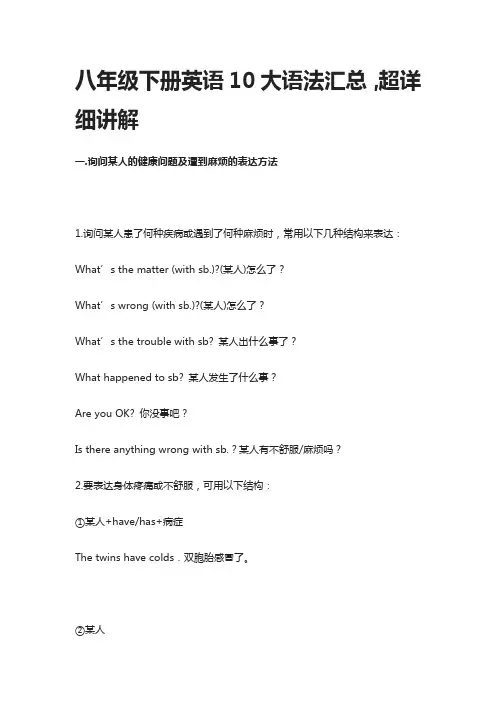
八年级下册英语10大语法汇总,超详细讲解一.询问某人的健康问题及遭到麻烦的表达方法1.询问某人患了何种疾病或遇到了何种麻烦时,常用以下几种结构来表达:What’s the matter (with sb.)?(某人)怎么了?What’s wrong (with sb.)?(某人)怎么了?What’s the trouble with sb? 某人出什么事了?What happened to sb? 某人发生了什么事?Are you OK? 你没事吧?Is there anything wrong with sb.?某人有不舒服/麻烦吗?2.要表达身体疼痛或不舒服,可用以下结构:①某人+have/has+病症The twins have colds.双胞胎感冒了。
②某人+have/has+a+headache/toothache/stomachache/backache/earache. She had a stomachache last night.她昨晚肚子痛。
③某人+have/has+a+sore+发病部位He has a sore throat.他喉咙痛。
④某人+hurt(s)+身体部位或反身代词He hurt his leg.他的腿受伤了。
⑤某部位+hurt(s).My head hurts badly.我头痛得厉害。
⑥某人+have/has+a pain+in one’s+身体部位I have a pain in my chest.我胸口痛。
⑦(There is) something wrong with one’s+身体部位There is something wrong with my right eye.我的右眼有毛病。
⑧其他表达方式She has a heart trouble.她有心脏病。
He got hit on the head.他头部受到了撞击。
She cut her finger.她割破手指了。
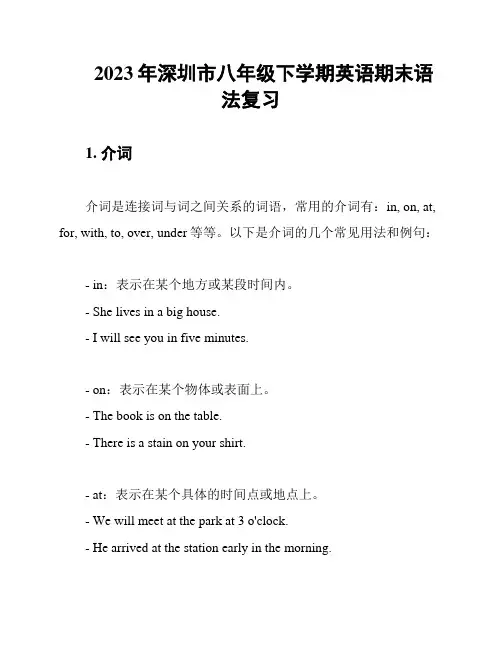
2023年深圳市八年级下学期英语期末语法复习1. 介词介词是连接词与词之间关系的词语,常用的介词有:in, on, at, for, with, to, over, under等等。
以下是介词的几个常见用法和例句:- in:表示在某个地方或某段时间内。
- She lives in a big house.- I will see you in five minutes.- on:表示在某个物体或表面上。
- The book is on the table.- There is a stain on your shirt.- at:表示在某个具体的时间点或地点上。
- We will meet at the park at 3 o'clock.- He arrived at the station early in the morning.2. 动词时态动词时态表示动作发生的时间,常见的时态有:一般现在时、一般过去时、一般将来时等。
以下是几个常用时态的用法和例句:- 一般现在时:表示经常或惯性的动作。
- I go to school every day.- She likes to read books.- 一般过去时:表示过去发生的动作或存在的状态。
- We visited our grandparents last weekend.- He studied hard for the exam.- 一般将来时:表示将来要发生的动作或存在的状态。
- They will go on a trip next month.- She is going to meet her friends tomorrow.3. 名词单复数名词用于表示人、物或概念,单数和复数形式有所区别。
以下是名词单复数的用法和例句:- 单数名词:表示一个人、一个事物或一个概念。
- I have a book.- She is a student.- 复数名词:表示多个人、多个事物或多个概念。
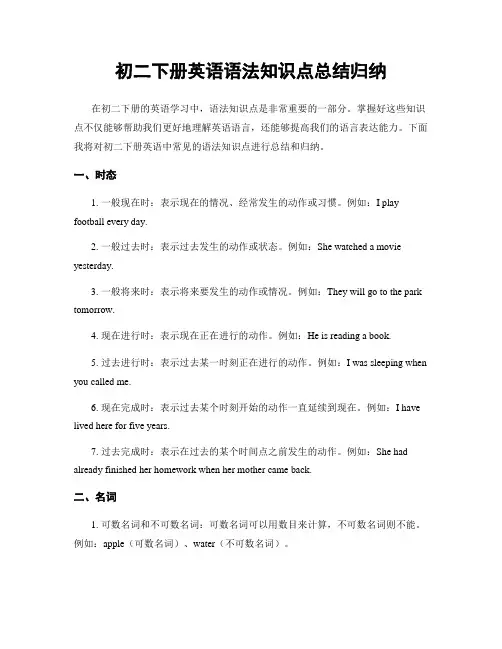
初二下册英语语法知识点总结归纳在初二下册的英语学习中,语法知识点是非常重要的一部分。
掌握好这些知识点不仅能够帮助我们更好地理解英语语言,还能够提高我们的语言表达能力。
下面我将对初二下册英语中常见的语法知识点进行总结和归纳。
一、时态1. 一般现在时:表示现在的情况、经常发生的动作或习惯。
例如:I play football every day.2. 一般过去时:表示过去发生的动作或状态。
例如:She watched a movie yesterday.3. 一般将来时:表示将来要发生的动作或情况。
例如:They will go to the park tomorrow.4. 现在进行时:表示现在正在进行的动作。
例如:He is reading a book.5. 过去进行时:表示过去某一时刻正在进行的动作。
例如:I was sleeping when you called me.6. 现在完成时:表示过去某个时刻开始的动作一直延续到现在。
例如:I have lived here for five years.7. 过去完成时:表示在过去的某个时间点之前发生的动作。
例如:She had already finished her homework when her mother came back.二、名词1. 可数名词和不可数名词:可数名词可以用数目来计算,不可数名词则不能。
例如:apple(可数名词)、water(不可数名词)。
2. 单数名词和复数名词:单数名词表示一个,复数名词表示多个。
例如:cat (单数名词)、cats(复数名词)。
3. 物主代词:my, your, his, her, its, our, their。
例如:This is my book.三、形容词和副词1. 形容词:修饰名词,描述事物的特征。
例如:a beautiful flower。
2. 副词:修饰动词、形容词或其他副词,表示时间、地点、方式等。
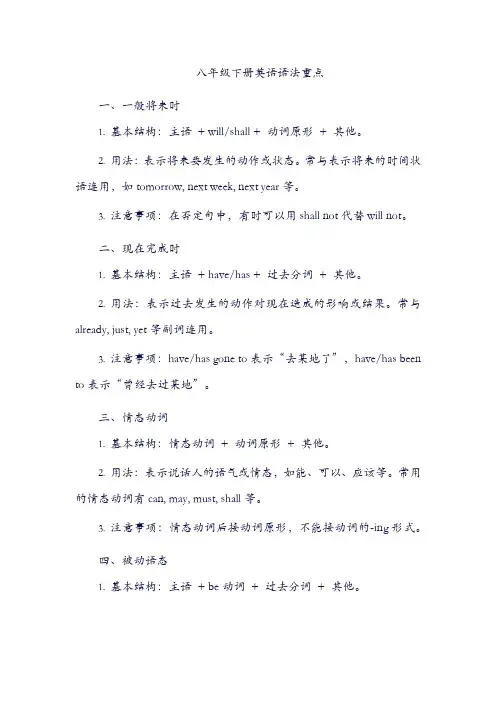
八年级下册英语语法重点一、一般将来时1.基本结构:主语+ will/shall + 动词原形+ 其他。
2.用法:表示将来要发生的动作或状态。
常与表示将来的时间状语连用,如tomorrow, next week, next year等。
3.注意事项:在否定句中,有时可以用shall not代替will not。
二、现在完成时1.基本结构:主语+ have/has + 过去分词+ 其他。
2.用法:表示过去发生的动作对现在造成的影响或结果。
常与already, just, yet等副词连用。
3.注意事项:have/has gone to表示“去某地了”,have/has been to表示“曾经去过某地”。
三、情态动词1.基本结构:情态动词+ 动词原形+ 其他。
2.用法:表示说话人的语气或情态,如能、可以、应该等。
常用的情态动词有can, may, must, shall等。
3.注意事项:情态动词后接动词原形,不能接动词的-ing形式。
四、被动语态1.基本结构:主语+ be动词+ 过去分词+ 其他。
2.用法:表示主语是动作的接受者。
常与by引导的方式状语连用,如by machine, by air等。
3.注意事项:被动语态的时态变化主要通过be动词的变化来实现,不同时态的被动语态需要注意与该时态的主动语态相对应。
五、不定代词和冠词用法1.不定代词:表示泛指或不确定的代词,如some, any, other等。
some用于肯定句,any用于否定句或疑问句;other表示“其他的”。
2.冠词:表示特指或泛指的词,分为定冠词the和不定冠词a/an。
a用于辅音音素开头的单词前,an用于元音音素开头的单词前;the 表示特指或上文提到的某个名词。
3.用法:不定代词和冠词一起使用时,可以构成限定词短语,如some books, the school gate等。
限定词短语可以修饰名词,表示特指或泛指的概念。
4.注意事项:在英语中,不定代词和冠词的使用是有规则和限制的,需要根据上下文和语境来判断使用哪个代词或冠词。
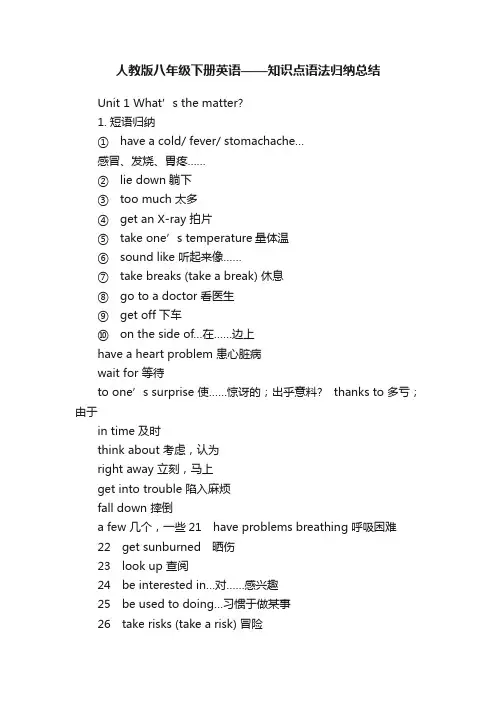
人教版八年级下册英语——知识点语法归纳总结Unit 1 What’s the matter?1. 短语归纳①have a cold/ fever/ stomachache…感冒、发烧、胃疼……②lie down 躺下③too much 太多④get an X-ray 拍片⑤take one’s temperature量体温⑥sound like 听起来像……⑦take breaks (take a break) 休息⑧go to a doctor 看医生⑨get off 下车⑩on the side of…在……边上have a heart problem 患心脏病wait for 等待to one’s surprise 使……惊讶的;出乎意料? thanks to 多亏;由于in time 及时think about 考虑,认为right away 立刻,马上get into trouble 陷入麻烦fall down 摔倒a few 几个,一些21 have problems breathing 呼吸困难22 get sunburned 晒伤23 look up 查阅24 be interested in…对……感兴趣25 be used to doing…习惯于做某事26 take risks (take a risk) 冒险27 lose one’s life 丧生28 became of 因为29 run out (of) 用尽,耗尽30 be ready to do sth. 准备做某事31 cut off 切除32 climb down 爬下33 get out of 离开;从……出来34 tell of 讲述35 the importance of (doing sth.) (做某事的)重要性36 be in control of 掌管,管理37 make a decision 做决定38 keep on doing sth. 坚持做某事39 give up 放弃40 cut/ hurt oneself 使自己受伤2. 典句必背①What’s the matter?②I have a stomachache.③What should I do?④Should I take my temperature?⑤I think you should lie down and rest.⑥If your head and neck still hurt tomorrow, then go to a doctor.⑦His love for mountain climbing is so great that he kept on climbing mountains even after this experience.3. 用法集萃(1) 当别人心情不好,身体不适或遇到麻烦时,我们可以用如下表达表示关心:What’s the matter?What’s the matter with you?What’s wrong with …?What’s the trouble\problem with …?(2) 英语中常用have描述身体的不适,此时have意为“患有”,常用结构:①have a + 疾病例:have a cold 感冒;have a fever 发烧;have a cough 咳嗽②have a + 身体部位-ache例:have a headache 头痛;have a toothache 牙痛③have a sore + 身体部位例:have a sore throat 咽喉痛;have a sore back 背痛(3) lie down躺下;tell lies/a lie 说谎含义过去式过去分词躺;平躺lay lain位于撒谎;说谎lied lied(4) maybe & may be①maybe,“或许”,常用于句首,表示可能性,后加句子。
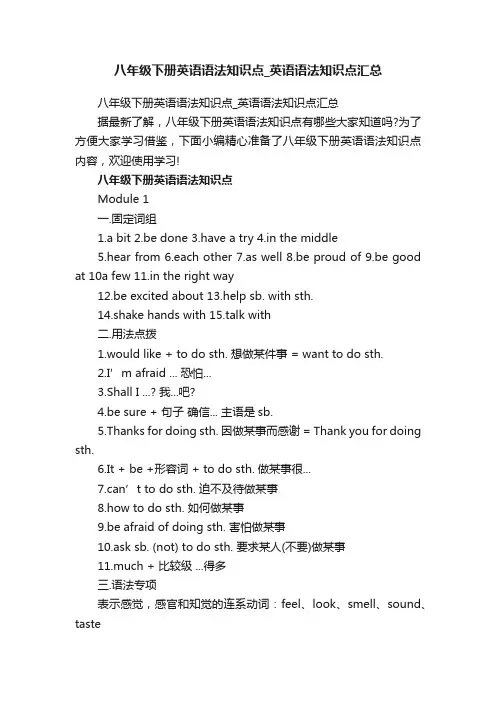
八年级下册英语语法知识点_英语语法知识点汇总八年级下册英语语法知识点_英语语法知识点汇总据最新了解,八年级下册英语语法知识点有哪些大家知道吗?为了方便大家学习借鉴,下面小编精心准备了八年级下册英语语法知识点内容,欢迎使用学习!八年级下册英语语法知识点Module 1一.固定词组1.a bit2.be done3.have a try4.in the middle5.hear from6.each other7.as well8.be proud of9.be good at 10a few 11.in the right way12.be excited about 13.help sb. with sth.14.shake hands with 15.talk with二.用法点拨1.would like + to do sth. 想做某件事 = want to do sth.2.I’m afraid ... 恐怕...3.Shall I ...? 我...吧?4.be sure + 句子确信... 主语是sb.5.Thanks for doing sth. 因做某事而感谢 = Thank you for doing sth.6.It + be +形容词 + to do sth. 做某事很...7.can’t to do sth. 迫不及待做某事8.how to do sth. 如何做某事9.be afraid of doing sth. 害怕做某事10.ask sb. (not) to do sth. 要求某人(不要)做某事11.much + 比较级 ...得多三.语法专项表示感觉,感官和知觉的连系动词:feel、look、smell、sound、taste__这些连系动词,后面通常接形容词Module 2一.固定词组1.lots of2.enter a competition3.first prize4.good luck5.think about6.a lot = very7.make up8.at the moment9.for example 10.be different from 11.so far 12.count down 13.by train14.have a wonderful time 15.find out二.用法点拨1.help sb. + do sth. 帮助某人做某事2.stop doing sth.停止做某事3.need(实意动词) + to do sth.4.Invite sb. + to do sth. 邀请某人做某事5.one of + the +形容词最高级+复数名词表示“最...之一”6.love doing sth. 喜爱做某事7.have been to + sw. 去过某地(但已经回来) have gone to + sw. 去了某地(现在没回来)8.begin to do sth. 开始做某事9.enjoy doing sth. 喜欢做某事10.learn to do sth. 学习做某事三.语法专项现在完成时:构成have/has + 动词过去分词__不规则动词需额外记忆。
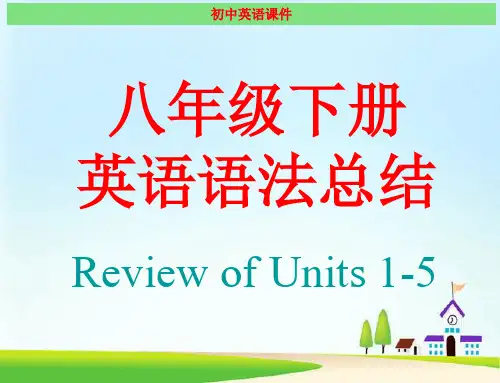
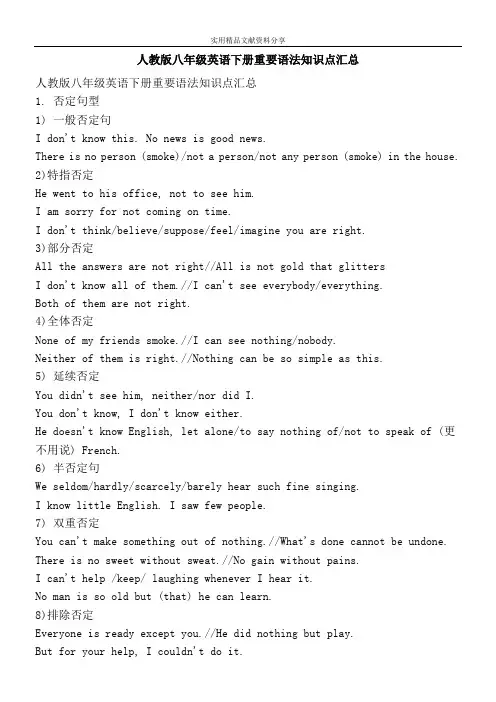
人教版八年级英语下册重要语法知识点汇总人教版八年级英语下册重要语法知识点汇总1. 否定句型1) 一般否定句I don't know this. No news is good news.There is no person (smoke)/not a person/not any person (smoke) in the house.2)特指否定He went to his office, not to see him.I am sorry for not coming on time.I don't think/believe/suppose/feel/imagine you are right.3)部分否定All the answers are not right//All is not gold that glittersI don't know all of them.//I can't see everybody/everything.Both of them are not right.4)全体否定None of my friends smoke.//I can see nothing/nobody.Neither of them is right.//Nothing can be so simple as this.5) 延续否定You didn't see him, neither/nor did I.You don't know, I don't know either.He doesn't know English, let alone/to say nothing of/not to speak of (更不用说) French.6) 半否定句We seldom/hardly/scarcely/barely hear such fine singing.I know little English. I saw few people.7) 双重否定You can't make something out of nothing.//What's done cannot be undone. There is no sweet without sweat.//No gain without pains.I can't help /keep/ laughing whenever I hear it.No man is so old but (that) he can learn.8)排除否定Everyone is ready except you.//He did nothing but play.But for your help, I couldn't do it.9)加强否定I won't do it at all.//I can't see it any more.//He is no longer a boy.2. 判断句型1) 一般判断句It is important for us to learn English.It is kind of you to help me sincere means honest.The boy is called/named Tom.We regarded/consider it as an honor.2)强调判断It is English that we should learn.//It is he who helped me a lot.3)弱式判断Your sentence doesn't sound/look/appear/feel right.You look/seem as if/as thought you had been there before.Maybe/Perhaps/ she is ill.He is probably ill.//He is likely ill. //It is possible that he is late 4) 注释判断He can remember so many English words, that is (to say) he is a living dictionary.(活字典)5) 正反判断That sounds all right, but in fact it is not.6) 比较判断It is more a picture than a poem.7) 互斥判断He or you are wrong. Either he is right or I am.3. 祝愿祁使句式1) 一般句式Study hard and keep fit. Be brave! Don't be shy! Get out of here.2)强语式Do tell me. Never tell a lie.3) 委婉祈使句Please tell me the true. Would/Will/Won't do me a favor?Would/Do you mind my smoking? What/How/ about going on foot?4)建议祈使句Let us go. Let us know the time. Don't let the fire out.Let's not waste the time. You'd better start early.Shall we listen to some music? Why don't you get something to drink? Suppose/supposing you pick me up at about six?I suggest we (should) take the train.5)祝愿句Success to you! //Wish you a good journey.May you have a happy marriage. //Here's to your success!Allow me to propose a toast to our friendship!4. 感叹句型How well he speaks! //How kind she is! //What a nice weather it is! Here he comes! //Such is life! //Wonderful! // Help!5. 疑问句型1) 一般疑问句Is he a doctor?//Do you the way to the station?2)反意疑问句He is a teacher, isn't he?//It is quite cheap, don't you think?3) 特殊疑问句What is the distance/width/size/population/temperature/fare?Who is he? What is he?(干什么的)//What is he like? // How is he? How do you like him? //What do you think of him?What ever do you mean by saying this?4)选择疑问句He is a doctor or a nurse?5)间接疑问句Do you know how old he is? //Tell me if (whether) you like it.What do you think/say/suppose I should do?6. 数词句型1) 表数目It is exactly ten o'clock.//It is five miles away from here.He is more than/over/ at least not less than 20.He is under/at most/no more than 20.2)表年月日He was born on April 22 1994/in 1994 on the morning of Oct.1.3)表年龄He is 20 years old/years of age.//He is at the age of 10.4)表倍数It is four times that of last years.This is four times as big (again) as that one.This is four times bigger than that one.The income is double what it was.The output of coal was 200% greater than in 1998.5)表计量It is 10 meters long/wide/high.//It costs me 100 yuan.I spent 10 hours to finish it.//It took me 10 days to finish it.It is worth 100 yuan.7. 关联指代句型1)两项关连I have two books, one is Chinese; the other English.I have five books, one is Chinese; the others English.To say is one thing, but/and/ to do is another.One the one hand, I am your teacher, and on the other hand, I am also you friend.Some like to play football, others are fond of basketball.2)先后顺序First/firstly, I wish good health, second/secondly success in your study, third/thirdly good luck in everything.First stop, then look, finally cross.At first/in the beginning/ he word hard. Later/Afterwards he is not so diligent.3)修饰限制This is the same book as I lost yesterday.This is the same book that I lost yesterday.(同一本书)Don't trust such a man as over praise you.He/One/Those/They who should come failed to appear.A man/A person/The one/Anyone/People who saw her liked her very much.The day/time/moment will come when China is strongest in the world.4) 两项连接He can speak not only English but also French.The book is both interesting and instructive.It is neither cold nor hot.Please either come in or go out.The old worker has experience and knowledge as well.5)加和关系Besides literature, we have grammar and writing.Apart from oxygen, there are some other gases in the air.In addition to "if", there is many other conjunctions that can introduce conditional clauses.I must go now, incidentally, if you want that book.You seem to like tea, so do I.8. 比较句型1)等比句He is as tall as I. // He is the same height as I.She is no less diligent than he. The lab is no better than a cottage.2) 差比句I speak English worse than he does.//He is not so/as tall as I am.Our knowledge is much inferior to their.3) 极比句He is the tallest of all in the class.None/No one/ is so blind as those that won't see.Nothing is so easy as this.4)比例句The more a man knows, the more he feels his ignorance(无知).5) 择比句He is taller than any other boy in the classIt is better late than never.//They would die than live as slavesHe prefers doing to talking//He prefers to do rather than to talk.He prefers mathematics to English.//I'd rather stay here.6)对比句You think me idle, but on the contrary, I am busy.They are working hard while you are wasting your time.9. 比喻句型We must work like him.//He behaves as his father does.He speaks English as if/though he was a foreigner.10. 条件假设句1) 一般事实If we succeed, what will the people say?Suppose it rains, what shall we do?Persevere(坚持) and you'll succeed.2)虚拟条件句If I were you, I would go.//If you had seen it, you would have been moved.3)反条件句Unless you try, you'll never succeed.//Don't move, or/else/otherwise I'll shot.4)唯一条件句If only I have another chance, I shall do better.Only in this way can we learn English well.So/As long as we don't lose heart, we'll succeed.5)推论条件句Since that is so, there is no more to say.Now that you are grown up, you must stop this behavior.11. 时间句型1)一般时When I see him, I'll tell him.2) 表同时You'll grow wiser as you grow older.Work while you work, play while you play.He worked, at the same/in the meantime he listened to the music.3)限制时Every/each time when I went to his house, he was out.By the time that we got there, he was out.4)交替时Sometimes he sings, sometimes he dances.At one time the baby cries, at another it talks.5)先时I stopped hem before he began to talk with me.6)后时I'll tell you after I finish it.7)紧接时As soon as I see him, I'll tell him.Once you begin, you must continue.The (very) moment/instant (that) I saw him, I recognized him. On hearing the news, she bust into tears.Hardly had I seen the light, when I heard a loud thundering.8)延续时I haven't seen him since I came here.A friend is never know till/until a man have need.12. 地点句型1) 一般地点Where have you been?Where there is a will, there is a way.2)方位Hebei lies in the east of China.Japan is lies to the east of China.The house faces (to) the south.He is sitting at the front of the classroomHe is standing in front of/before me.He is sitting at the back of/behind me.He is sitting in the back of/at the rear of the classroom. He is sitting next to/besides me.He is sitting close to/near me.At the top of/On top of the shelf, there are some books.He is sitting on the left/right.The mountain you see to the right is the Purple Mountain. 13. 原因句型He didn't go to school because he was ill.Since we are all here, let's begin our meeting.It might rain yesterday, for the ground was wet.Now (that) we have finished the work, we can go home.I am glad to meet you.I am sorry that I hear that.Thank you for your help.That is why he failed to come.He didn't come because of/on account of the weather.He went out of curiosity.I succeeded thanks to his help.This failure is due to the fact they lack experience.Owing to our joint efforts, the task was fulfilled.What are studying English for?For what reason did you choose this?What's the point of asking his to do that?How come you never told me about it?What with the wind and what with the rain, our walk was spoiled.14. 目的句型He stopped aside so that she could go in.He sits in the front in order that he can see words clearly.He gets up early so as to/in order to have time to do exercises. He repeated it for fear that there should be any mistake.15. 结果句型It was very cold, so that the river froze.They cost a lot of money, so/therefore we use them carefully. He is such a good man that every one likes him.He ran so fast that no one could catch him.He hurried to the house only to find that it was empty.I was caught in the rain. As a result, I had a bad cold.16. 程度句型How often do you write to your parents?How long do you stay at home?It is so beautiful that we all love it.It is too big for you.He is too excited to speak.He is not old enough to know this.The letter must be sent as soon as possibleYou must work as hard as you can.As far as I know, I can speak only English.17. 让步句型Though/Although he is rich, (yet/still) he doesn't show off.Yang as he is, he know a lot of things.Even if/though he succeeded, he was not proud.No matter what you say, I'll still try to do it.Keep calm, whatever happens.In spite of this, we must go ahead with our plans.Regardless of all the difficulties, we'll fight it out to the end.18. 转折句型I searched everywhere but could not find him.You may go, only return quickly.He is seriously ill, still there is hope of his recovery.It looked like rain, however it was clear in the afternoon.He is still young, yet he is high up in the position.He didn't tell me the truth, I know it, though.19. 省略句I think/say/suppose/expect/believe/hope so.Why not come earlier next time?。
八年级下册英语复合句语法知识点归纳总结复合句是由两个或更多的句子组成的句子。
下面是八年级下册英语复合句的一些常见语法知识点总结:1. 关系代词关系代词用来引导定语从句,常见的关系代词有:who, whom, whose, which, that。
关系代词在从句中作为主语、宾语、或定语。
例句:- The girl who is wearing a red dress is my sister.- This is the book that I borrowed from the library.2. 定语从句定语从句用来修饰名词或代词,给出更多的信息。
定语从句通常用关系代词引导。
例句:- The house where he was born is now a museum.3. 时间状语从句时间状语从句用来表示时间,通常由when, while, before, after, since, until等引导。
例句:- I will visit my grandparents when I have time.4. 原因状语从句原因状语从句用来表示原因,通常由because, since, as等引导。
例句:5. 结果状语从句结果状语从句用来表示结果,通常由so, such...that, so that等引导。
例句:- The weather was so cold that we couldn't go outside.6. 目的状语从句目的状语从句用来表示目的,通常由in order to, so as to等引导。
例句:- I study hard in order to pass the exam.7. 条件状语从句条件状语从句用来表示条件,通常由if, unless, as long as, provided that等引导。
例句:- If it rains, we will stay indoors.以上是八年级下册英语复合句的一些常见语法知识点。
Unit 6 An old man tried to move the mountains.1.短语归纳2.典句必背3.用法集萃(1)As soon as the man finished talking, Yu Gong said that his family could continue to move themountains after he died. 那个男人一说完,愚公就说他死后他的家人会继续移动那些山。
❖as soon as表示“一...就...”,引导时间状语从句。
例:As soon as I went through customs, I jumped in a taxi. 我一过海关就跳上了一-辆计程车。
❖注意:在含as soon as、when等引导的时间状语从句的主从复合句中要遵循“主将从现”的原则,即主句如果用一般将来时,从句要用一般现在时。
(2)This story reminds us that you can never know what’s possible unless you try to make it happen.这个故事起帮我们,如果你不试图使它发生,你水远都不可能知道可能发生的事情。
❖remind作动词,意为“提醒;使想起”。
常见的搭配有:(3)I think it’s a little bit silly. 我觉得那有点儿愚蠢❖ a little bit是固定搭配,意为“有点儿;稍微”,用来修饰形容词或副词。
例:Your bedroom is a little bit dirty. Please clean it up.你的卧室有点儿脏。
请把它打扫干净。
Mike checked the papers a little bit carelessly, so he failed the exam again.迈克在检查试卷的时候有点儿粗心,所以他考试又没有及格。
八下 unit 1 语法归纳总结询问某人的健康问题及遇到事情麻烦等常用的表达方式1 What's the matter (with xx)?(某人)怎么了?2 What's wrong (with xx)?(某人)怎么了?3 What's the trouble (with xx)?(某人)怎么了?4 What happened (to xx)?(某人)发生了什么事?5 Are you OK? 你没事吧?6 Is there anything wrong with xx? 某人有什么事吗?练一练: What's the matter with your leg? ﹦________ ________ ________ ________ __________?﹦________ ________ ________ ________ __________?表达身体疼痛或不舒服,可用如下结构1. sb + have/ has + 病症Eg: Sb has/ have a cold/ bad cold/ cough/ fever/ temperature/ nosebleed某人有感冒,重感冒,咳嗽,发烧,出鼻血2.sb + has/have + a + 身体部位 + acheEg: Sb has/have a headache / toothache/ earache/ backache/ heartache/ stomachache 某人头痛,牙痛,耳朵疼,后背痛,心痛,胃痛3. sb + has/ have + a sore +发病部位Eg: Sb has/have a sore throat/ eye/ back/ arm某人嗓子疼,眼睛疼,后背疼,胳膊疼4. sb + has/have a pain (pains) in one's + 身体部位Eg:Sb has/have a pain in sb's head/ neck 某人头痛,脖子痛5. sb的某部位 + hurt(hurts)注:hurt的过去式,过去分词还是hurteg: My head hurts. 我头痛 His legs hurts。
人教版初中英语八年级下册全册各单元知识点、语法归纳整理Unit1W hat’s the matter?一.重点短语归纳1.foot---feet脚tooth---teeth牙齿2.have a cold感冒3.have a stomachache胃疼4.have a sore back背疼5.have a sore throat喉咙疼6.have a fever发烧7.lie down and(have a)rest躺下休息have a rest休息8.hot tea with honey加蜜的热茶9.see a dentist看牙医see a doctor看医生10.drink lots of water多喝水11.lots of ,a lot of,许多。
大量a lota lot of=lots of,可以修饰可数名词复数和不可数名词,一般用在肯定句中。
:There are lots of(a lot of)books in our library.There is a lot of water on the grounda lot,是一个副词词组,跟动词连用;表示十分,很等意思;Thanks a lot.12.have a toothache牙疼13.That’s a good idea好主意14.go to bed去睡觉go to bed early早上床睡觉15.feel well感到好 feel ill感到不舒服I don’t feel well=I’m not feeling well我感觉不舒服.16.start doing/to do sth开始做某事to do是一件事情完成了,开始做另外一件事情doing是原来的那件事情做到一半,现在又开始做了,是同一件事情。
17.two days ago两天前18.get some rest多休息,休息一会儿19.I think so我认为是这样20.be thirsty口渴21.be hungry饥饿22.be stressed out紧张23.listen to music听音乐24.healthy lifestyle健康的生活方式25.traditional Chinese doctors传统中医26.need to do sth需要做某事I have a toothache.I need to see a dentist.我牙痛,我需要去看牙医.We need to keep our classroom clean.我们需要保持教室的干净.27.too much+不可数名词太多的…much too+形/副实在太…极其,非常too many+可数名词复数太多的…28.be good for sth./doing sth.对什么有益,对什么有好处be bad for sth./doing sth.对什么有害be good to对…好be good at=do well in在……方面好,擅长be good(bad) for、be good at的相关用法1.be good for对......有益Doing morning exercises is good for your health.做早操对你们的建康有益。
初二下册英语语法知识点总结归纳英语语法作为学习英语的重要组成部分,在初二下册学习中占据了重要地位。
在本文中,我们将对初二下册英语语法知识点进行总结归纳,以帮助同学们更好地掌握和应用这些知识。
一、动词时态1. 一般现在时:表示经常性或普遍性的动作或状态。
常与副词always, usually, often等连用。
2. 现在进行时:表示正在进行的动作。
常与副词now, at the moment 等连用。
3. 一般过去时:表示过去某个时间发生或存在的动作或状态。
4. 过去进行时:表示过去某一时刻正在进行的动作。
5. 一般将来时:表示将要发生的动作或存在的状态。
6. 未来进行时:表示将来某一时刻正在进行的动作。
7. 现在完成时:表示已经完成的动作对现在造成的影响或结果。
8. 过去完成时:表示在过去某个时间之前已经完成的动作或状态。
二、限定词1. 定冠词:the。
用于特定的人或事物前,或在表达顺序、习惯等特定用法时使用。
2. 不定冠词:a, an。
用于泛指某一类人或事物时使用。
3. 0冠词:不用于特指或泛指的情况下,直接使用名词。
4. 指示代词:this, that, these, those。
用于指示特定的人或事物。
5. 物主代词:my, your, his, her, its, our, their。
表示所属关系。
三、形容词和副词的比较级和最高级1. 一般形容词和副词的比较级和最高级:在一般情况下,形容词和副词的比较级在词尾加er,最高级在词尾加est。
2. 以e结尾的形容词和副词:在比较级和最高级前加r或st。
3. 以辅音字母+y结尾的形容词和副词:变y为i,再加er或est。
4. 双写结尾字母的形容词和副词:在比较级和最高级前双写结尾字母,再加er或est。
四、名词性从句1. 主语从句:由what, who, which, whether等引导的从句,在句子中作主语。
2. 宾语从句:由that, if, whether等引导的从句,在句子中作宾语。
人教版八年级下册英语Unit 3单元语法知识点总结本单元重点短语的具体用法1. do the dishes:洗餐具- I need to do the dishes before going out.(我出门前需要洗餐具。
)2. take out the rubbish:倒垃圾- Can you take out the rubbish, please?(你能倒一下垃圾吗?)3. fold your clothes:叠衣服- Remember to fold your clothes neatly.(记得把你的衣服叠整齐。
)4. sweep the floor:扫地- She sweeps the floor every day.(她每天都扫地。
)5. make your bed:整理床铺- It's your turn to make your bed.(轮到你整理床铺了。
)6. clean the living room:打扫客厅- We need to clean the living room before guests arrive.(在客人到来之前,我们需要打扫客厅。
)7. go out for dinner:出去吃饭- Let's go out for dinner tonight.(我们今晚出去吃饭吧。
)8. go to the movies:去看电影- They like to go to the movies on weekends.(他们喜欢在周末去看电影。
)9. stay out late:在外面待到很晚- Don't stay out late, it's not safe.(别在外面待太晚,不安全。
)10. get a ride:搭车- I'll get a ride with my friend.(我会和我朋友一起搭车。
)11. work on doing sth:从事做某事- He is working on writing a novel.(他正在写一本小说。
八年级下册英语语法总复习一、现在完成时的“完成用法”和“未完成用法”1.现在完成时的"完成用法"现在完成时的"完成用法"指的是动作发生在过去某一时刻并已结束,但该动作对现在产生了影响,与现在情况具有因果关系。
例如:He has turned off the light.他已把灯关了。
(动作结束于过去,但说明的是现在的情况--灯现在不亮了。
)现在完成时"完成用法"的特点是动作不延续,因此,该时态只能与表示不定的过去时间状语(如:already,yet,before,recently等)、频度时间状语(如:never,ever,once等)、包括现在时刻在内的时间状语(如:this morning /month /year...,today等)连用。
例如:Have you found your pen yet?你已找到你的钢笔了吗?2.现在完成时的"未完成用法"现在完成时的"未完成用法"指的是动作开始于过去某一时刻,一直延续到现在,或可能还要继续下去。
例如:He has lived here since 1978.自从1978年以来,他一直住在这儿。
(动作起始于1978年,一直住到现在,可能还要继续住下去。
)I have been in the army for more than 5 years.我在部队已经呆了五年多了。
(动作开始于5年前,一直延续至今,有可能还要继续下去。
)此种用法的句中常需一个表示一段时间的状语(由since或for引导),或表示与现在时刻相连的时间状语(如:up to now,so far到目前为止)等。
例如:I have heard nothing from him up to now.到目前为止我没有他的任何消息。
注意:(1)现在完成时的未完成用法只适用于延续性动词,不可用于终止性动词,即瞬间完成或延续时间很短的动词。
如:come,go,arrive,leave,join,become,die等。
(2)现在完成时常见两种句型:①主语+have / has been+for短语②It is+一段时间+since从句例如:He has been in the League for three years.或It is three years since he joined the League. 他入团已三年了。
3、延续性动词和终止性动词的概念英语中,动词按其动作发生的方式、动作发生过程的长短,可分为延续性动词和终止性动词。
延续性动词表示能够延续的动作,这种动作可以延续下去或产生持久影响。
如:learn, work, stand, lie, know, walk, keep, have, wait, watch, sing, read, sleep, live, stay等。
终止性动词也称非延续性动词、瞬间动词或短暂性动词,表示不能延续的动作,这种动作发生后立即结束。
如open, close, finish, begin, come, go, arrive, reach, get to, leave, move, borrow,buy等。
4、延续性动词的用法特征1.延续性动词可以用于现在完成时,其完成时态可与表示"段时间"的状语连用。
表示"段时间"的短语有:for two years, during the past three years, since last year, how long等。
如:I have learned English since I came here.自从我来到这儿就学英语了。
2.延续性动词不能与表示短暂时间的"点时间"状语连用。
如:It raind at eight yesterday morning.(误) rain为延续性动词,而at eight表示"点时间",前后显然矛盾。
如果用延续性动词表示一瞬间的动作,可以借助come, begin, get等终止性动词来表示。
上句可改为:It began to rain at eight yesterday morning.(正)又如:-When did you get to know Jack?-Two years ago.-Then you've known each other for more than two years.-That's right.5、终止性动词的用法特征1.终止性动词可用来表示某一动作完成,因此可用于现在完成时。
如:The train has arrived.火车到了。
Have you joined the computer group? 你加入电脑小组了吗?2.终止性动词表示的动作极其短暂,不能持续。
因此,不可与表示一段时间的状语连用(只限肯定式)。
如:(1)他死了三年了。
误:He has died for three years.正:He has been dead for three years. 正:He died three years ago.正:It is three years since he died. 正:Three years has passed since he died.(2)他来这儿五天了。
误:He has come here for five days.正:He has been here for five days. 正:He came here five days ago.正:It is five days since he came here. 正:Five days has passed since he came here.(1)、(2)句中的die、come为终止性动词,不能与表示"段时间"的状语连用。
那么,应如何正确表达呢?可以采用下面的四种方法:(1)将句中终止性动词转换为相应的延续性动词,如上面两例中的第一种正确表达方式。
下面列举几例:leave→be away, borrow→keep, buy→have, begin/start→be on, die→be dead, move to→live in, finish→be over,join→be in/be a member of, open sth.→keep sth. open, fall ill→be ill, get up→be up, catch a cold→have a cold。
(2)将句中表示"段时间"的状语改为表示过去确定时间的状语,如下面两例中的第二种正确表达方式。
(3)用句型"It is+段时间+since..."表达原意,如上面两例中的第三种正确表达方式。
(4)用句型"时间+has passed+since..."表达原意,如上面两例中的第四种正确表达方式。
3.终止性动词可用于现在完成时否定式中,成为可以延续的状态,因而可与表示一段时间的状语连用。
如:He hasn't left here since 1986.I haven't heard from my father for two weeks.4.终止性动词的否定式与until/till连用,构成"not+终止性动词+until/till ..."的句型,意为"直到……才……"。
如:You can't leave here until I arrive.直到我到了,你才能离开这里。
I will not go to bed until I finish drawing the picture tonight.今天晚上直到我画完画,我才上床睡觉。
5.终止性动词可以用于when引导的时间状语从句中,但不可以用于while引导的时间状语从句中。
when表示的时间是"点时间"(从句谓语动词用终止性动词),也可以是"段时间"(从句谓语动词用延续性动词)。
而while表示的是一个较长的时间或过程,从句谓语动词用延续性动词。
如:When we reached London, it was twelve o'clock. (reach为终止性动词)Please look after my daughter while/when we are away. (be away为延续性动词短语)6.终止性动词完成时不可与how long连用(只限于肯定式)。
如:误:How long have you come here? 正:How long have you been here?正:When did you come here?二、现在完成时与一般过去时的区别1. 一般过去时表示过去某个时间发生的事、存在的状态或经常发生的动作。
说话的侧重点只在于陈述一件过去的事情,不强调对"现在"产生的影响。
如:He visited Guilin in 1998.他1998年参观过桂林。
(只说明去桂林的时间)2. 现在完成时表示动作发生在过去,对现在造成了影响或产生了结果。
不与确定的过去时间状语连用。
如:Jill has bought a new computer.吉尔买了一台新电脑。
(着重点是现在有了一台新电脑)3. 两种时态的区分(1)一般过去时的谓语动词用过去式,而现在完成时的谓语基本构成是"助动词have /has +过去分词"。
如:The film started at 7 o’clock. He has been a teacher for many years.(2)一般过去时通常与表示过去的时间状语连用。
如:yesterday, last week, two years ago, just now, in 2002等;而现在完成时则常与just, already, ever, never等副词和these days, this week, since..., for...等表示一段时间的状语连用。
看看以下的几组句子,有什么区别?① Have you seen the film?(A) Did you see the film?(B)[说明] 你看过这部电影吗?(A)句强调的是被问者对剧情是否了解;(B)句强调的是看这部电影的动作是否发生过,并不强调是否知道其内容。